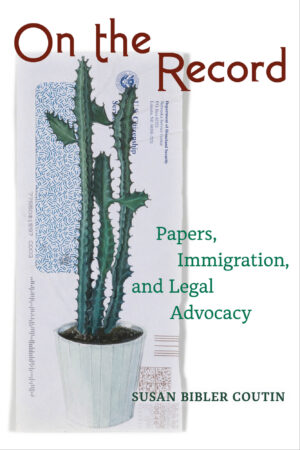Representing Immigrants in a Hostile Legal Environment
by Susan Bibler Coutin, author of On the Record: Papers, Immigration, and Legal Advocacy

When the Trump administration federalized the District of Columbia in August 2025, one of its first actions was to eliminate Washington D.C.’s ban on police cooperation with federal immigration enforcement. Such ramping up of enforcement has occurred throughout the U.S. immigration system. The Trump administration expanded expedited removal, which deports people without a court hearing, to individuals who entered without inspection and have been in the United States for less than two years. Relatedly, a broad swath of immigrant residents are now subject to detention without the possibility of release on bond. New detention centers, such as Florida’s “Alligator Alcatraz” which advocates have denounced as inhumane, are being constructed rapidly. Furthermore, H.R.-1, the so-called “Big, Beautiful Bill,” dramatically increased funding for immigration enforcement and raised immigration application fees to levels that are likely unaffordable for many. In such an adverse environment, how can those who are eligible for status pursue their claims? And how can attorneys provide them with legal support?
My book, On the Record: Immigrants, Papers, and Legal Advocacy, sheds light on these questions. Based on fieldwork at an immigrant-serving nonprofit from 2011-2014 and written during the first Trump administration and the beginning of the Biden administration, On the Record details the challenges experienced by immigrant residents and their attorneys. Immigrants who seek legal status in the United States must meet particular requirements, such as being petitioned for by a US citizen or lawful permanent resident relative, having a well-founded fear of persecution, or suffering substantial harm from a crime and collaborating with the police in its investigation. These requirements are defined narrowly. For example, grandparents cannot petition for grandchildren, even if they are the ones raising them. Seeking status requires assembling a documentary record of identity, years of continuous presence, experiences of persecution, income, kin relations, good moral character, educational history, and so forth. In short, immigrants must document their lives, even though being undocumented may make it harder to do so. The government, to which applications are submitted, views them with suspicion, treating even minor discrepancies, such as two different spellings of the applicant’s name, as signs of fraud. Nonprofits often provide the high quality and affordable legal assistance that can help in navigating these processes yet their services are in short supply.
The experiences of one couple who approached the nonprofit for a consultation illustrate the punitive nature of immigration policy. Ana María, a US citizen, met with a service provider to learn whether she could petition for her husband Rodolfo, who was undocumented. The service provider questioned them about their marital history, whether anyone else had petitioned for them, any other relatives they had in the United States, how Rodolfo had originally entered the United States, whether he had been detained or arrested, and whether they had been victims of any crime. Rodolfo and Ana María explained that they had been married for six years, no one had petitioned for Rodolfo, he had a sibling in the United States, he had entered without inspection, he was briefly detained at the border and was returned to Mexico, he had committed a minor infraction, and was not a crime victim. The provider then delivered her analysis: it would be difficult for Rodolfo to qualify for a spousal visa. Because he had entered the country without inspection, he would be required to travel to a consulate outside of the United States to obtain the visa. And, since he lived within the United States without legal status for over a year, he would be barred from reentering the country for ten years. Waiving the ten-year-bar would require demonstrating that Rodolfo’s absence created an exceptional hardship for Ana María. While waiting to learn if the waiver would be granted, they would have to be separated. In short, Rodolfo’s mode of entry and the time he spent in the United States without status made it impossible for this family to remain together legally, for at least the time being.
My fieldwork at the nonprofit revealed how attorneys and paralegals strove to be supportive, despite the punitive nature of immigration policies. Service providers expressed empathy with their clients, acknowledging the emotional hurdles they faced. During appointments, service providers took the time to explain US immigration policies to clients in understandable terms so that they could make informed decisions about their cases. In so doing, they attempted to make law transparent rather than uncertain, equipping clients with the knowledge that would maximize their chances of gaining status. Advocates attempted to reduce application burdens, going above and beyond to help clients locate information and documents. Fees at the nonprofit were low, making its services affordable. Most importantly, service providers treated their clients with dignity, recognizing their value as persons.
By detailing the adverse legal environment in which immigrant residents and their allies operate, On the Record sheds light on punitive processes that have only intensified, as well as on the aspirations of immigrant residents, and compassionate approaches to delivering legal services. Paying attention to immigrants’ and advocates’ visions of a future justices is more important now than ever.